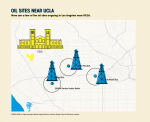An environmental advocacy group is trying to end oil drilling near neighborhoods in Los Angeles.
Stand Together Against Neighborhood Drilling Los Angeles, an environmental group advocating against oil drilling in Los Angeles, was endorsed by the North Westwood Neighborhood Council at their January meeting. STAND-LA plans to urge the Los Angeles City Council to enact a buffer around current oil drilling sites in LA County to mitigate the health hazards of living near these sites.
There are 24 oil and gas facilities currently operating in unincorporated LA County and 68 active oil fields in the Los Angeles Basin, according to a 2018 study on public health and safety risks of oil and gas facilities in LA County by the Los Angeles County Department of Public Health. Additionally, Karla Tovar, a public information officer for the LAC DPH, said the LAC DPH believes the report contains data that encourages strengthening public health and safety policy.
Nicole Wong, the research chair at STAND-LA, said the findings of the report were essential in helping them move forward with their legislative campaign to protect communities from oil drilling.
“We started this campaign for the city of LA to enact a human health and safety buffer,” Wong said. “We believe that 2,500 feet, which is little less than half a mile, would be the most protective way for the city to ensure public health and community safety with regards to these drilling sites.”
Amir Tarighat, treasurer of the NWWNC, said the council voted to support the establishment of the buffer after a representative from STAND-LA presented their case before the council.
“One of the few main purposes of neighborhood councils is to actually advise the city council on the issues,” Tarighat said. “Different organizations, generally when they are for or against something, go around to the different neighborhood councils, presenting their opinions.”
Tarighat added the NWWNC supported this policy because it aligned with the goals of the council.
“In addition to the fact that it is one of our core responsibilities, this is a really important issue for us because our neighborhood and our community really prioritize progressive values such as things that protect low-income and minority communities, which are being impacted,” Tarighat said. “It’s a safety and health issue.”
Eyal Li, a fourth-year environmental science student and member of Environmentalists of Color Collective at UCLA, said this report provided evidence supporting the buffer, which would force drill sites to maintain a certain distance from heavily populated areas.
“This is a regulation that would impose a buffer zone of a certain distance between drill sites and land uses that are considered sensitive, such as residential areas, churches, schools and hospitals. And that definition is not quite concrete yet,” Li said. ”For example, it could be expanded to include parks or anywhere people frequent, and that would be ideal.”
Li said the report’s conclusions support STAND-LA’s platform and the ECC’s findings.
“It confirmed what activist groups such as STAND-LA have said for years,” Li said. “They said that these have horrible adverse health effects and it’s basically outrageous that people live literally next door to these drill sites.”
Li said the report’s findings reveal that living near oil drilling sites results in health hazards for residents. Li added while this was primarily an environmental issue, the location and regulations of these oil sites also relate to socioeconomic discrimination because hazardous drilling sites affect minority communities the most.
“Even in sites where you’re in wealthier, whiter communities, there are more stringent, enforced regulations on those oil sites, and those tend to be further away,” Li said. “If you’re in these lower-income, minority neighborhoods, such as Vernon and East LA, you could have sites literally next door to houses and no one’s enforcing the regulations.”
Li said the ECC aims to raise awareness and educate students about how climate change and socioeconomic discrimination are closely related.
“The most important thing that will really resonate with students is the horrible environmental racism these oil corporations have perpetuated for decades without any regulation,” Li said. “Many students are from these areas, and they can talk about their lived experience with polluters and being ignored by the city government until now.”
